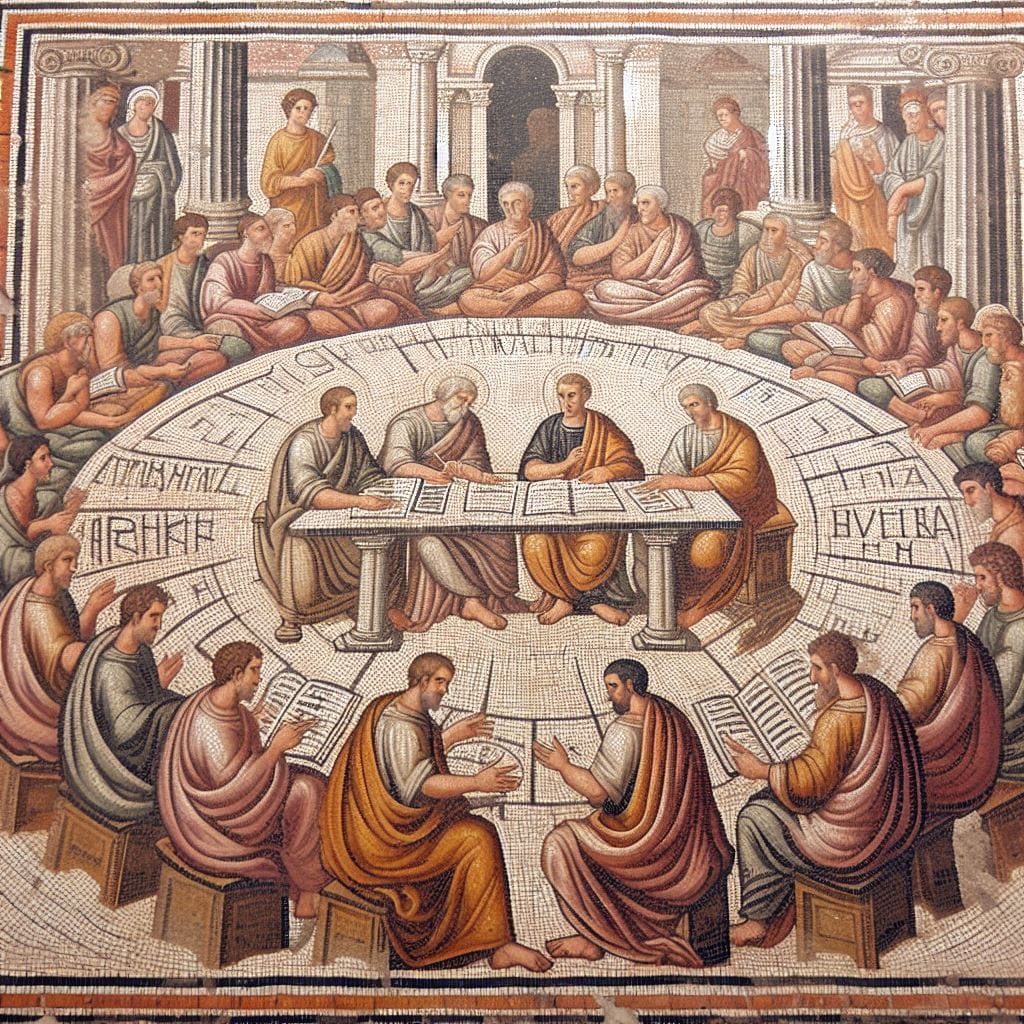Roman law was the engine of the Roman Empire, a comprehensive system that still shapes legal practices today. But what were the key features of Roman law, and how did they come to exert such a profound influence over time? This concise exploration of Roman law introduces you to its fundamental components, from its inception to its codification, and its undeniable imprint on the legal frameworks we operate within today.
Key Takeaways
- Roman law, rooted in the Twelve Tables, provided a foundational legal order that evolved alongside societal changes during Roman expansion, adapting to incorporate diverse populations and legal matters, such as property rights and family law.
- The Roman legal system was structured through roles ranging from magistrates to emperors with contributions from legal scholars, whose works like the Digest, Codex, and Institutes outlined in Emperor Justinian’s Corpus Juris Civilis were pivotal in systemizing legal principles.
- The influence of Roman law is enduring and deeply embedded in the structure of modern legal systems, particularly in continental Europe, shaping legal tenets surrounding property rights, civil law, and the conceptual basis of public and private law.
The Genesis of Roman Law

Rome, in its nascent stages, was a society bound by customs and religious principles. Over time, these practices transformed into legal subjects and discourses, setting the stage for the genesis of Roman law. As the Roman Republic grew, so did the complexity of its legal system, with a significant catalyst being the Twelve Tables. This written law, a cornerstone in the history of Roman law, unified the diverse customs and traditions, setting forth the rights and obligations of all Roman citizens.
The Twelve Tables not only brought order to Roman society but fostered the evolution of a complex legal system that would influence the Roman world as well.

The Twelve Tables: Foundation of Legal Order
Enacted in 451-450 BC, The Twelve Tables marked a paradigm shift in Roman society. This legal text sought to elucidate the principles of Roman law, making them accessible to the general populace. The authors remain unknown, yet their work laid the groundwork for a legal system that would shape a civilization. The Tables encompassed a broad spectrum of legal matters, from civil and criminal law to property rights and family law. They served as a compass guiding Roman society through the complex labyrinth of law.
In the bustling forums of Rome, citizens would gather to discuss these laws, debating the merits and shortcomings, the ambiguities, and the clarity. These discussions were not confined to the educated elite; they involved everyone, from the patrician at the apex of Roman society to the plebeian. The Twelve Tables were not just a legal text, as they were a social contract binding the entire Roman society.
Expansion of Legal Horizons
With the expansion of Rome’s influence came the broadening of its legal horizons. The conquered territories were integrated into the Roman legal framework, which required periodic adjustments to accommodate the needs of new situations and populations. Laws such as the Lex Canuleia and the Leges Liciinae Sextiae were introduced, dealing with issues arising from the diversity and expansion of Rome’s population, like intermarriage between social classes and limits on land possession.
The development of jus gentium, a law governing interactions between Romans and foreigners, was a testament to Rome’s evolving societal needs. As Rome grew, its legal system had to adapt, incorporating new laws and principles to maintain order and justice. This adaptability not only shaped the legal system within the empire but also influenced the laws of other territories, even after the decline of Roman authority. Roman law was not static – it was dynamic, evolving with the times, adapting to new circumstances, and expanding its horizons.
The Structure of Roman Legal Institutions

The society of Rome was mirrored in the architecture of its legal institutions. From magistrates vested with authority to emperors who wielded power over laws, Roman law was shaped by various figures and institutions. Furthermore, legal experts and judges like Gaius, Ulpian, and Paulus made significant contributions to the development of Roman law, illuminating its complexities and nuances through their scholarly work.
From Magistrates to Emperors
Far from being mere representatives, the magistrates in ancient Rome served as the pillars of the Roman legal system. Their roles were diverse, from delegating tax collection to enforcing public morality and conducting a census. Praetors, who served as judges or jurors in civil or criminal trials, played a crucial role in the administration of justice. However, their influence waned as the law gradually centralized around the emperors and advisors.
The transition from magistrates to emperors signified a shift from representative democracy to centralized imperial authority in the Roman Empire. The emperor not only ruled the empire but also influenced its laws, altering them through decrees and edicts. With this power, they regulated public morality, issued edicts and proclamations, and provided written answers to legal matters. The Roman legal system was not just a network of laws – it was a reflection of power dynamics.
Legal Experts and Education
Not only the powerful but also individuals dedicated to legal scholarship left their mark on the Roman legal landscape. Jurists like Julius Paulus and Gaius, through their opinions, advice, and commentaries on legal texts, left an indelible mark on Roman law. Roman law was not taught in formal law schools, and instead, aspiring jurists acquired a comprehensive understanding of Roman legal procedure and a thorough knowledge of the law through self-study and mentorship.
Roman legal scholars focused their studies on ancient Roman legal texts, considering them to be among the most important collections of texts from the ancient world in shaping legal comprehension. These scholars not only interpreted the laws but also sought to understand the philosophies and principles underpinning them. The evolution of Roman law was not just a product of power shifts and societal changes; it was also a testament to the intellectual rigor of its legal scholars and their dedication to Roman legal science.
Codification and Influence of Corpus Juris Civilis

One of the most significant milestones in the evolution of Roman law was the codification of the Corpus Juris Civilis under Emperor Justinian I. This comprehensive legal code consolidated all existing Roman law, integrating it with Orthodox Christian and Hellenistic influences. This codification not only streamlined Roman law but also left a lasting impact on legal systems throughout Europe.
The Digest, Codex, and Institutes
Far from a simple compilation of laws, the Corpus Juris Civilis was a well-structured compendium comprising:
- The Digest, which compiled all existing Roman laws
- The Codex, which delineated the laws of the empire
- The Institutes, which served as a primer for the laws outlined in the Digest
This comprehensive and systematic organization of Roman legal principles and practices streamlined legal processes within Roman society.
Imagine walking through a vast library filled with legal texts, each one containing a piece of the puzzle that is Roman law. The Digest, Codex, and Institutes were not merely compilations; they were the keys to understanding the complexity and intricacies of Roman law. They provided the foundations of jurisprudence, shaping the understanding and application of law in Roman society.
Legacy in Modern Legal Systems
The legacy of Roman law extends far beyond the boundaries of the ancient empire. Its principles and concepts continue to shape modern legal systems. Most countries in continental Europe and derivative systems elsewhere base their legal codes on Roman law. This historical influence can be seen in various aspects of their legal systems. The principles of property law, the principle of personality, and the fundamental framework of civil law bear the unmistakable imprint of Roman law.
The Corpus Juris Civilis, in particular, had a significant influence on the development of European legal systems, playing a crucial role in shaping modern law in several European countries. Roman law also influenced the concept of property rights in modern law, shaping ownership, possession, and contract law. The influence of Roman law is not confined to the pages of history – it is a living legacy that continues to guide our understanding of justice and order.
The Public and Private Spheres of Roman Law

Just like every coin has two faces, so did Roman law – public law and private law. While public law dealt with the governance of the Roman commonwealth, such as constitutional matters and property allocation, private law focused on the concerns of individuals, including personal relationships and property entitlements. Both spheres, while distinct, were interconnected, providing a comprehensive framework for maintaining order and justice in Roman society.
Governing the State: Public Law
The realm of public law in Ancient Rome was the domain of the state. It covered:
- Constitutional matters
- Administrative law
- Criminal law
- Formal imperial legislation through sources such as oratio, lex edictalis, and edictum
Constitutional matters were handled using unwritten law, uncodified norms, and customs, along with written laws that collectively directed the procedural governance of Ancient Roman public law.
Administrative law addressed matters that were not related to the interests of individual citizens, encompassing constitutional, criminal, and administrative issues. The influence of Roman public law on criminal law was significant, as it established a legal framework that defined crimes, methods of investigation, and forms of punishment within the criminal justice system.
Public law was the backbone of the Roman legal system, providing the framework for the governance of the state.
Regulating Relationships: Private Law
If public law was the backbone of the Roman legal system, private law was its lifeblood. It dealt with the interactions between individuals, regulating aspects such as contracts, property ownership, and family relationships. The evolution of jus civile (civil law) and the role of customary law (ius) as a hereditary element of the Roman legal system were the major components of private law.
Contracts required three essential elements to be considered valid in Roman law: a ‘Thing’ being contracted for, a Price, and Agreement/Consent between the involved parties. Property rights were absolute, allowing individuals to own both land and movable property. Moreover, Roman private law regulated family relationships by establishing family units under the authority of the pater familias and overseeing temporary or permanent marriages for legal sexual relations. Private law, in essence, was the law of everyday life, regulating relationships and personal affairs among Roman citizens.
Criminal Law and Legal Proceedings in Ancient Rome

A complex net of regulations and procedures made up of Roman criminal law. From the classification and punishment of crimes to the conduct of trials, Roman law sought to maintain order and ensure justice. Given the diversity of its population and the vastness of its territories, the Roman criminal justice system had to be comprehensive and adaptable, capable of meeting the demands of its society.
Classifying and Punishing Crimes
Crimes in Roman law were classified into categories such as civil crimes, committed by lower-class individuals, and capital crimes, like maiestas, homicide, vis, and falsum. Punishment was not meted out blindly – it took into account factors like the offender’s citizenship status and social standing. For instance, the senatorial and equestrian classes typically received milder penalties compared to ordinary citizens.
The severity of punishments ranged from fines to physical penalties and, for exceptionally grave offenses, death. Factors such as premeditation, provocation, frequency, and the influence of alcohol were considered in determining the severity of punishments. Roman criminal law was not just about punishing offenders as it was about ensuring that the punishment fit the crime.
Conducting Trials and Seeking Justice
The wheels of justice in Rome turned through various legal procedures, including:
- Legis actiones: The plaintiff publicly summoned the defendant to court, presenting cases orally with witness testimony.
- The formulary system: Introduced a written statement called a formula, improving procedural efficiency.
- Cognitio extra ordinem: A more informal procedure that allows the judge to gather evidence and make a decision without a formal trial.
These procedures helped ensure justice in ancient Rome. Cognitio extra ordinem was a procedural system that introduced new concepts to the fundamental principles of penal law in Roman trials. Through these various systems, Roman law sought to ensure justice, whether in punishing the guilty or in defending the innocent. The pursuit of justice was not a mere ideal; it was a tangible reality embodied in the procedures and practices of Roman law.
Roman Law’s Evolution Through Time
Rather than being etched in stone, Roman law was a living, evolving entity. From the early Republic to the Byzantine Empire, Roman law adapted to the changing needs and demands of its society, proving its resilience and versatility. While its principles remained constant, its application and interpretation evolved, reflecting the changing times.
Early Republic to Late Republic
During the early Republic, Roman law underwent notable reforms such as the Lex Canuleia, allowing intermarriage between patricians and plebeians, and the Leges Liciniae Sextiae, imposing a limit on the quantity of public land a citizen could possess. As the Republic grew into an empire, the legal system had to expand and adapt to accommodate the evolving concept of Roman citizenship, resulting in the development of the ius civile and the separation of religion from jurisprudence.
However, the transition was not smooth. The late Republic faced a multitude of legal challenges, including:
- political instability
- social unrest
- widespread corruption
- the proliferation of private armies
Despite these challenges, Roman law contributed to the integration of territories conquered during the late Republic, imposing the Roman legal system upon them. The evolution of Roman law was a journey marked by trials and triumphs, reflecting the wider narrative of the Roman Republic itself.
Classical Antiquity to Byzantine Continuity
Into classical antiquity and the Byzantine era, the flame of Roman law continued to burn bright. The Byzantine Empire, in particular, saw a significant evolution of Roman law, marked by the integration of Greek legal concepts and the influence of Emperor Justinian I, who codified all existing Roman law into the Corpus Juris Civilis.
This consolidation of Roman law resulted in a fusion of cultures and external influences, leading to the propagation of Roman legal principles beyond its initial sphere. Through its evolution, Roman law left a lasting impact not just on the East but also on the West, shaping the legal landscape of Western civilization.
Summary
From the bustling forums of Rome to the grand courts of the Byzantine Empire, the legacy of Roman law endures. It served as the foundation for legal systems across the globe, shaping our understanding of justice and order. Its principles and concepts, from the Twelve Tables to the Corpus Juris Civilis, continue to govern many aspects of our lives. The enduring influence of Roman law is a testament to its adaptability, resilience, and universality. As we navigate the complexities of modern legal systems, we can look back to Roman law not just as a historical relic but as a living legacy that continues to guide us on the path of justice.
People Also Ask:
What is Roman law in simple terms?
Roman law was the legal system of ancient Rome from 753 BCE to 476 CE and continued in the Eastern Empire until 1453 CE. It served as the basis for the legal system of most continental European countries.
What were 3 Roman laws?
Three important Roman laws were the Twelve Tables, Lex Aquilia, and Lex Julia. The Twelve Tables were the earliest attempt by the Romans to create a code of law, Lex Aquilia dealt with matters of property damage, and Lex Julia was important in regulating marriage and family life.
What are the four basic principles of Roman law?
The four basic principles of Roman law are legality, publicity, certainty, and justice. These principles are equality under the law, presumption of innocence, the burden of proof on the accuser, and the ability to disregard unfair laws.
What was the role of The Twelve Tables in Roman law?
The Twelve Tables played a crucial role in Roman law by outlining the rights and duties of Roman citizens and laying the groundwork for the evolution of Roman legal system.
How did Roman law adapt to the expansion of the Roman Empire?
Roman law adapted to the expansion of the Roman Empire by developing new laws, such as the Lex Canuleia and Leges Liciinae Sextiae, to address the diverse issues arising from the expansion and the increasing population.
Hello, my name is Vladimir, and I am a part of the Roman-empire writing team.
I am a historian, and history is an integral part of my life.
To be honest, while I was in school, I didn’t like history so how did I end up studying it? Well, for that, I have to thank history-based strategy PC games. Thank you so much, Europa Universalis IV, and thank you, Medieval Total War.
Since games made me fall in love with history, I completed bachelor studies at Filozofski Fakultet Niš, a part of the University of Niš. My bachelor’s thesis was about Julis Caesar. Soon, I completed my master’s studies at the same university.
For years now, I have been working as a teacher in a local elementary school, but my passion for writing isn’t fulfilled, so I decided to pursue that ambition online. There were a few gigs, but most of them were not history-related.
Then I stumbled upon roman-empire.com, and now I am a part of something bigger. No, I am not a part of the ancient Roman Empire but of a creative writing team where I have the freedom to write about whatever I want. Yes, even about Star Wars. Stay tuned for that.
Anyway, I am better at writing about Rome than writing about me. But if you would like to contact me for any reason, you can do it at contact@roman-empire.net. Except for negative reviews, of course. 😀
Kind regards,
Vladimir
